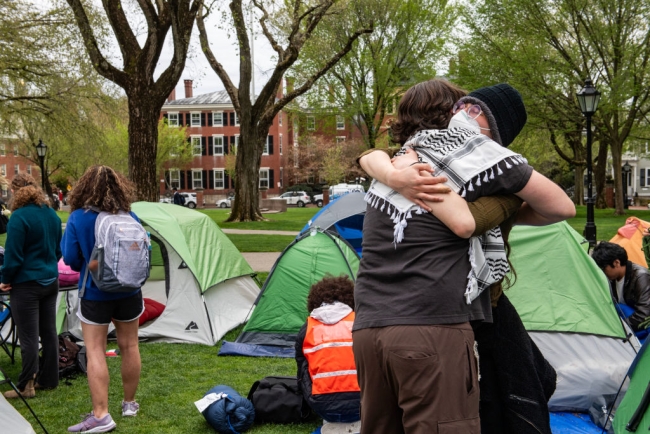You have /5 articles left.
Sign up for a free account or log in.

Brown University students embrace after reaching a deal with the university to take down their Gaza Solidarity encampment on April 30.
Joseph Prezioso/AFP/Getty Images
Seven months ago, in the days and weeks after Hamas’s Oct. 7 terror attacks, Jewish parents, alumni and community groups pored over the statements of American university leaders searching for signs of moral clarity. Now, following a wave of student protests over the Israel-Hamas war, we are once again closely reading presidents’ statements, this time about encampments.
On the face of it, this might appear like a situation where there is little clarity to be had for university presidents. But we shouldn’t be deterred by the challenge of difficult circumstances, and neither should university leaders. We must demand the same clear-sighted, long-term commitments from university presidents and chancellors now in response to the encampments as we did in the weeks following Oct. 7. We must not accept concessions to protesters or agreements that condone and validate their tactics, which threaten the wellbeing of their campus communities.
University leaders must not allow protesters who have dispensed with rules and adopted the tactics of mobs to gain leverage. They must eschew the temptation to reward these disruptors, even if doing so promises a momentarily peaceful conclusion to a turbulent academic year.
Instead, they must reaffirm their commitment to enforcing shared rules —the already established infrastructure that sustains free speech in even the broadest senses that can include hate speech. They must affirm that vile speech and violent actions are distinct things. Occupying buildings, defacing and vandalizing them, disrupting classroom learning, threatening to disrupt graduations, canceling exams and refusing to submit final grades—none of these are examples of free speech; neither are they protected by free speech rules.
One of the first universities to strike a conciliatory agreement with protesters was Brown University, whose president, Christina Paxson, publicly and forcefully condemned the boycott, divestment and sanctions (BDS) movement against Israel in 2019. In exchange for disbanding encampments, Paxson has offered a brief meeting this month to five members of the Brown Divest Coalition with five members of the Brown Corporation, followed by what in all likelihood will be a token board vote on divestment in the fall.
Agreements like these would appear to pay a pittance in exchange for a much-needed return to a quasi-normal campus routine. But not every university is Brown, which has taken steps to foster a well-supported diverse student culture, and actively recruited Jewish and especially Orthodox Jewish students in recent years.
Other institutions, like the University of California, Riverside, have shown us what a far less benign version of these same demands can look like. The terms of UC Riverside’s encampment-ending agreement reward the lowest common ignorance by giving credence to divestment demands with no basis in fact and no respect for the basic tenets of academic exchange. As part of the agreement, the university committed to an “ongoing review of Sabra hummus,” a U.S.-based company that’s long been a favored BDS target, and confirmed the business school had discontinued global programs at a range of sites, including Israel.
Some university leaders may imagine they can harmlessly negotiate the current protests away in exchange for a peaceful summer break, hoping —as we all do—that summer will see the end of the war and open up the possibility of a more peaceful fall 2024 here and abroad. Against this wager, these long seven months since the Oct. 7 terror attacks have made one thing abundantly clear: these protests are not anti-war, and these protesters will not be placated with token divestment votes.
Perhaps for the persuadable middle, students too ignorant to know which river and which sea, who are merely chanting along for the ride, the protests are about the horrors of war in a faraway place they know little about. But the committed activists have shown us their endgame, and it isn’t the end of the Israel-Hamas war or a ceasefire. For some time now, they’ve had a far broader target in view: the existence of Israel and Zionism itself, Jews’ right to self-determination in our ancestral homeland. The goal is erasure. A Middle East with no Israel.
We’ve seen too how this vision renders the distinction between “Zionist” and “Jew” largely irrelevant, and how easily the call to erase Zionism and Zionists becomes a full-throated plea to erase Jews. This too has been amply evidenced in the protest encampments in examples that range from the absurd (a list of foods requested at the University of California, Los Angeles, encampment included the instructions “no bagels!”) to the terrifying (a sign with a Star of David crossed out at Northwestern University; calls for Jews to go back to Poland or Europe at several colleges).
This endgame is intimately bound up with normalizing violence, and seems to prefer violence for its sheer efficacy and clarity, as we saw in the repeated calls on the part of national groups like Students for Justice in Palestine to valorize and emulate Hamas, reflected in protest signs declaring “By Any Means Necessary!” and “There’s Only One Solution!”
We need university leaders to be equally clear: American campuses will not be home to normalized violence against Jews. They will not negotiate with these demands. At the current impasse, they must certainly not reward these extremists.








